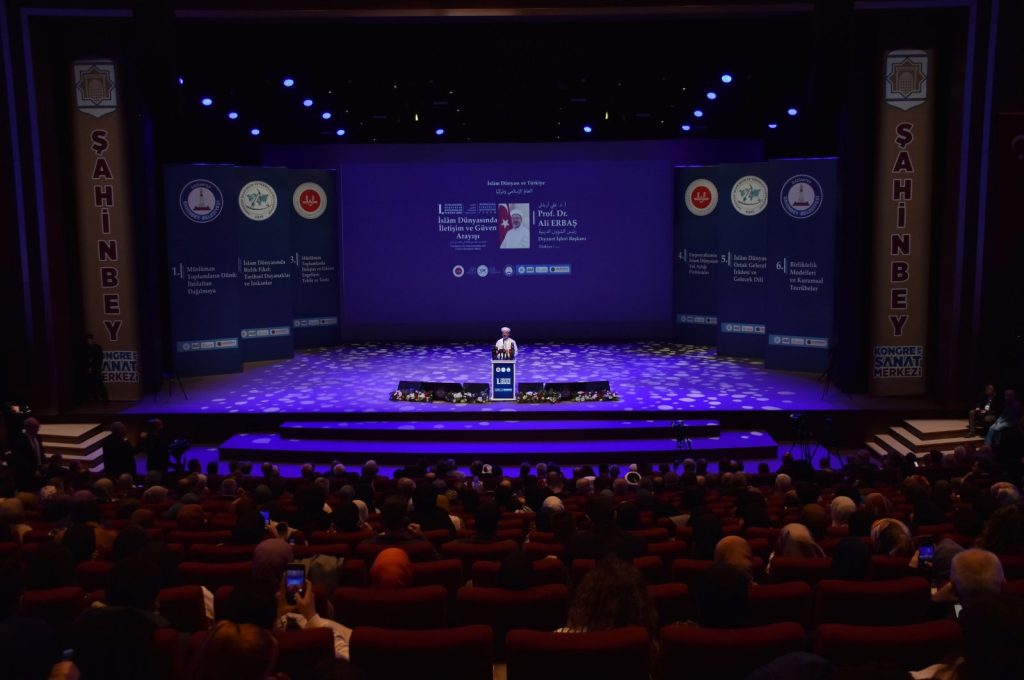The First International Strategic Negotiations Forum opened in southern Türkiye’s Gaziantep on Thursday, under the theme of “The Search for Communication and Trust in the Islamic World.” The event is attended by Islamic scholars from Türkiye, the United States, Qatar, Malaysia, Algeria, Pakistan, India, Iran and Mauritania.
Organized by Gaziantep Islam Science and Technology University (GİBTÜ), the Presidency of Religious Affairs and the municipality of Şahinbey district where the venue is located, the two-day forum tackles various topics, from “unity of opinion in the Islamic world,” to the history of Muslim communities, as well as communication and trust challenges in the communities. It will also delve into the problems of the Muslim world inflicted by imperialism and the joint will of the Islamic world for a common future and unity.
Addressing the forum, Ali Erbaş, head of the Presidency of Religious Affairs, noted that terrorism and violence were the most significant issues affecting the Islamic world.
Erbaş said Muslims needed to confront problems draining their energy and potential, through inspiration from their own roots of civilization so that they can present a concept based on Islam’s set of beliefs and civilized values to the modern age. He stated that anti-faith ideologies, disinformation and misperception stoke Islamophobia, one of the most significant issues for them.
“Islamophobia evolved into a cultural racism and outright adversity toward Islam,” he said.
“No one is safe in this world where the most basic human values are ignored, dignity, and right to life are trampled upon, where the powerful crushed the weak and racism over faith and culture became a political course,” Erbaş added.
He noted that Islamophobia was not a problem exclusive to Muslims and should matter to all of humanity. “Those staying away from Islam because of this hate speech are deprived of Islam’s message of blessing and principles of a faith that is the only hope for humanity,” he added.
“Those lacking Islam’s blessings and view of civilization are bogged down with problems of enormous proportions. Humanity is in a cycle of wars, terrorism, poverty, hunger and global injustice. It is going through one of the most challenging eras,” he said.
Highlighting the importance of strengthening cooperation and solidarity among Islamic societies, Erbaş stated: “To effectively combat all the evils that encompass life, there is a need for a common mindset, joint institutional structures and a collective strategic communication method.”
“Our greatest reference in this regard is our noble religion, Islam, because the principle of unity in Islam is not only a belief system but also a central point for Muslims to live together and in solidarity. Islam not only provides us with a way of life but also gives us a stance toward life and events, imposing responsibilities. In this context, our primary duty is to stand as one body against evil and to increase good deeds together,” he added. “Whenever Muslims have strayed from this consciousness, they have faced enormous difficulties.”
Erbaş emphasized that Muslims should come together more closely under the guidance of the Quran and Sunnah and stressed the need for increased friendship and solidarity among Muslims. He also pointed out the necessity of addressing problems with a common language, saying: “Steps should be taken that inspire hope and confidence in society. I believe that as we strengthen our unity and solidarity and enhance our areas of joint action, many of the issues in our region and the world can be easily resolved. When we achieve unity based on the principle of tawhid, reinforcing our solidarity and our will to act together, the tragedies and suffering that grip humanity, especially in the lands of the ummah, will come to an end. One of the most crucial means for bringing to life the ideal values that Islam presents for humanity is undoubtedly knowledge.”
Speaking at the forum, Ali Muhyiddin El-Karadaghi, head of the International Union of Muslim Scholars, said Islam’s holy book Quran is “food for the soul” and lifts the spirits for unity. “Enemies of Islam tried to harm our unity. They separated us from each other. Sectarianism and racism divided us,” he said. El-Karadaghi said the collapse of the Ottoman Empire was followed by the rise of racism.
Wadah Khanfar, head of Al Sharq Forum, highlighted the unity among Muslims. “Others always try to drive us into conflicts. We are separated from each other and thus, have always been subject to occupation,” he said.
Khanfar also stated that enemies had few troops and inferior weapons, but Muslims were defeated because they lacked unity.


